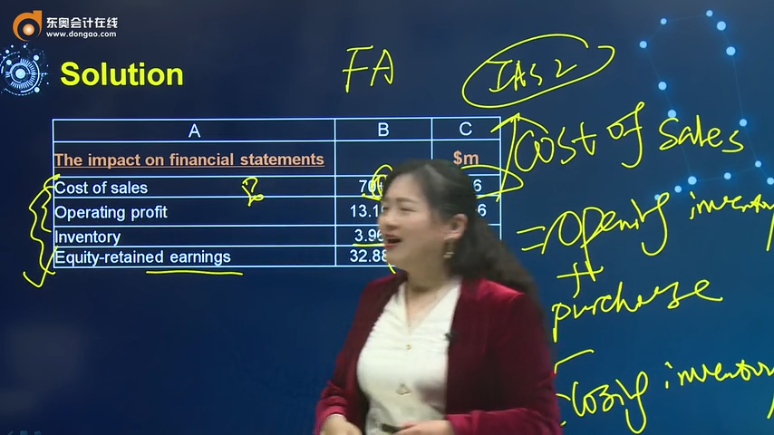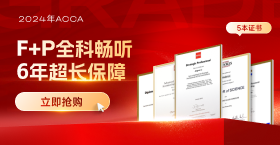关于本题的两个小疑问解答
此题有两个问题:(1)存货的impairment为何是进COGS?不是应该是资产减值损失么?;(2)operating profit的增加额为何与retained earning增加额完全一样?不考虑所得税的因素么?
问题来源:
PART Ⅴ Interpretation of financial statement s(3)
This scenario relates to three requirements.
Bun Co is a bakery which also owns two shops/cafes. Over the last two years, the company has experienced
declining profitability due to increased competition and so the directors wish to investigate if this is a sector-wide problem. Consequently, they have acquired equivalent ratios for the sector, some of which have been reproduced below.
Sector averages for the year ended 30 June 20X7:
|
Return on capital employed |
18.6% |
|
Operating profit margin |
8.6% |
|
Net asset turnover |
2.01 |
|
Inventory holding period |
4 days |
|
Debt to equity |
80% |
The following information has been extracted from the draft financial statements of bun
financial statements of Bun Co for the year ended 31 December 20X7:
Statement of profit or loss for the year ended 31 December 20X7:
|
$’000 |
|
|
Revenue |
100,800 |
|
Cost of sales |
-70,000 |
|
Gross profit |
30,800 |
|
Operating expenses |
-17,640 |
|
Profit from operations |
13,160 |
Statement of financial position as at 31 December 20X7:
|
$’000 |
|
|
Non-current assets |
55,000 |
|
Inventory |
3,960 |
|
Equity: |
|
|
Equity shares of $1 each |
17,000 |
|
Revaluation surplus |
5,400 |
|
Retained earnings |
10,480 |
|
32,880 |
|
|
Non-current liabilities: 10% bank loan |
14,400 |
Other relevant information to Bun Co:
(1) In 20X6, Bun Co acquired a popular brand name. At 31 December 20X7, the brand represented 20% of non-current assets. The remaining 80% of non-current assets comprises of the property from which Bun Co operates its bakery and shops. This property is owned by Bun Co and has no directly associated finance. The property was revalued in 20X4.
Other relevant information to Bun Co:
(2) In the year ended 31 December 20X7, Bun Co began offering discounted meal deals to customers. Bun Co hoped this strategy would help to reduce perishable inventory and reduce inventory holding periods.
(3) In January 20X8, it was decided to discount some slow-moving seasonal inventory which had a selling price of $1.5m. Under normal circumstances, these products have a gross profit margin of 20%. The inventory was sold in February 20X8 for 50% of what it had cost Bun Co to produce. The financial statements for the year ended 31 December 20X7 were authorized for issue on 15 March 20X8.
Required
(a) Adjust for the information in note (3) and calculate the 20X7 sector average equivalent ratios for Bun Co. (7 marks)
(b) Assess the financial performance and position of Bun Co for the year ended 31 December 20X7 in comparison with the sector average ratios. (10 marks)
(c) Explain three possible limitations of the comparison between Bun Co and the sector average ratios provided.
|
A |
B |
C |
|
(a) Adjustment to closing inventory |
||
|
Adjusting events : Inventory sold at the less price than the cost |
||
|
Error |
$m |
|
|
Closing inventory |
1.5-1.5 ×20% |
1.2 |
|
Cost of sales |
1.2 |
|
|
A |
B |
C |
|
Correct |
||
|
Closing inventory |
1.2 × 50% |
0.6 |
|
Cost of sales |
0.6 |
|
|
JE to adjust |
||
|
Dr Cost of sales |
1.2-0.6 |
0.6 |
|
Cr Closing inventory |
0.6 |
|
A |
B |
C |
|
The impact on financial statements |
$m |
|
|
Cost of sales |
70+0.6 |
70.6 |
|
Operating profit |
13.16-0.6 |
12.56 |
|
Inventory |
3.96-0.6 |
3.36 |
|
Equity-retained earnings |
32.88-0.6 |
32.28 |
|
A |
B |
C |
D |
|
Buns Co |
Sector average |
||
|
ROCE |
12.56/(32,28+14.4) |
26.90% |
18.60% |
|
Operating profit margin |
12.56/100.8 |
12.50% |
8.60% |
|
Inventory holding period |
(3.36/70.6)*365 |
17.4 days |
4 days |
|
Debt to equity |
(14.4/32.28) |
44.60% |
80% |
|
Asset turnover |
(100.8/46.68) |
2.16 |
2.01 |

李老师
2022-06-08 17:52:28 741人浏览
(1)正常情况下,在有impairment时进此项目,没有的话,也可以考虑进COGS项目;
(2)题中未提及所得税,暂不用考虑。
每个努力学习的小天使都会有收获的,加油!相关答疑
-
2023-11-30
-
2023-01-01
-
2022-01-24








 津公网安备12010202000755号
津公网安备12010202000755号